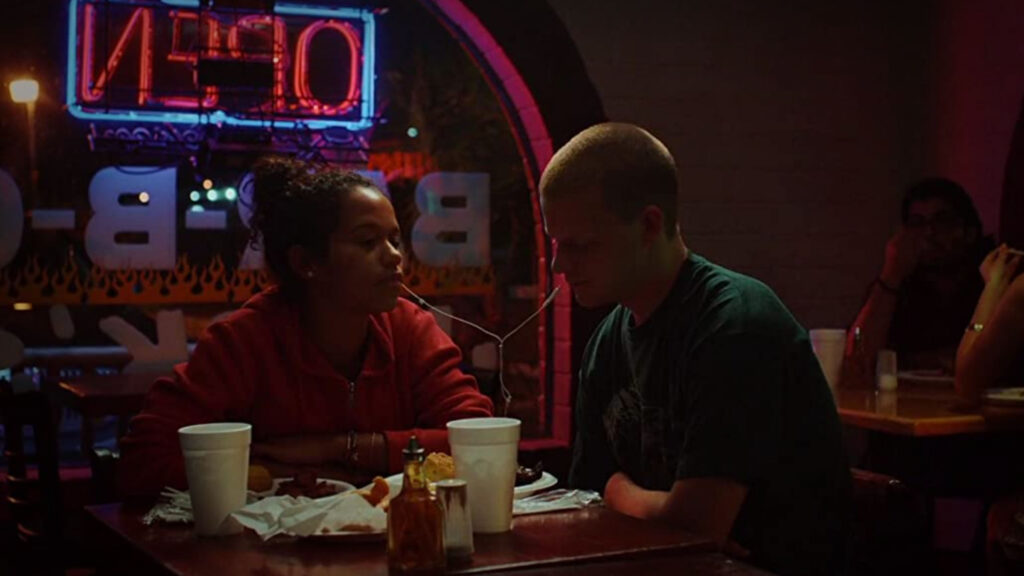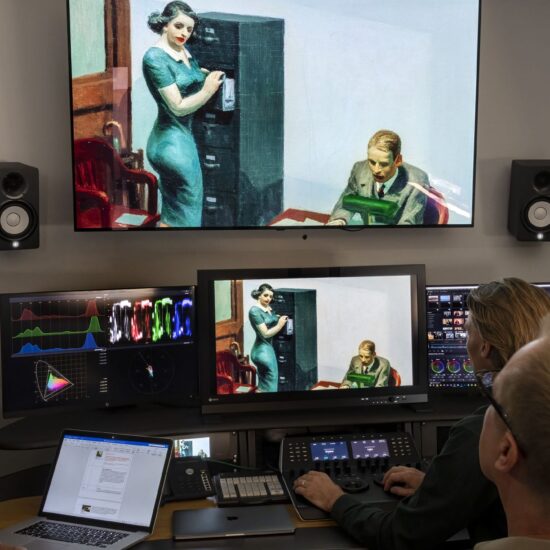
Each year, the Film Independent Spirit Awards gives the John Cassavetes Award to the year’s best feature made for under $1,000,000 ($500,000 prior to 2021). In this column, film critic David Bax compares and contrasts past Cassavetes winners with their most recent work.
***
Trey Edward Shults has made three feature films so far and, technically, only one of them (2017’s It Comes at Night) is a horror movie. But from the opening shot of 2015’s Krisha (which won him the John Cassavetes Award at the 31st Film Independent Spirit Awards in February of 2016)—a close-up of a woman’s face, stricken with an emotion we can’t quite place yet and accompanied by rumbling, ominous music—it’s clear that Shults will be exercising a talent for unnerving us, no matter what genre he may be working in.
In more ways than one, Krisha (a terrific film in its own right) serves as an introduction to what Shults will offer in the future. His camera—sometimes floaty and lingering, sometimes urgent and probing—is never just a passive observer. As with his less conventional aspect ratio choices (Krisha is mostly in 1.33:1), the near-constant Steadicam might be distancing in its self-consciousness to those not willing to submit themselves to Shults’ vision.
All this interplay between chaos and control, though, is integral to what Shults is trying to uncover. Namely, Krisha and his later work could be seen as an argument that the term “dysfunctional family” is a lazy misnomer. Every family has its own way of functioning, its own rules and enforcers, its own modes of operation. It’s those for whom the rules don’t work that appear to not function, who suffer the consequences of not fitting in.
Krisha, an expansion of Shults’ short film of the same title from the year before, is an engaging, moving and sympathetic portrait of a woman trying to work her way back into her family’s good graces, trying to play by their rules. But it’s also simply a promising calling card for the young artist. The Cassavetes Award doesn’t necessarily go to a first-time feature director but it did so here with good reason, helping to solidify the impression that Shults is a timely and vital filmmaker, both as a stylist and as a humanist.
After Krisha, Shults moved on to It Comes at Night. It’s a comparatively moodier affair, even if its concept is miles higher than Krisha’s simple Thanksgiving dinner premise. This time we have two families whose inter- and interpersonal relationships are tested by the end of the world and the horrors that follow.
So, in some ways, 2019’s Waves could be seen as a return to form. We do see some of the same cast; Bill Wise, the sardonic bother-in-law and unwilling Thanksgiving host from Krisha, shows up here as a high school wrestling coach while Krisha Fairchild herself (Shults’ aunt in real life) has a hyper-brief cameo as an English teacher. And, even though Waves takes place in Florida and Krisha is set in Texas, the upper middle class suburban homes that take center stage in both films are so remarkably similar in their layout that I did a bit of a double take. Yet, despite returning to a more here-and-now domestic setting, this comparatively gargantuan effort (coming in at nearly 45 minutes longer than It Comes at Night) actually continues Shults’ expanding ambitions.
For one thing, his camera is somehow even more dynamic, especially in the opening section, which introduce us to the life of star high school athlete/heartthrob Tyler (Kelvin Harrison, Jr., returning from It Comes at Night) with a series of wide-angle scenelets staged and edited at such a breakneck pace that they bring to mind the “you better buckle in” feeling of Moulin Rouge!’s opening fifteen minutes. The aspect ratio shifts ostentatiously throughout and the loud, heavy, almost wall-to-wall popular music is used to emulate the desperate abandon of youth in the same way as in Andrea Arnold’s American Honey.
Waves may not have the apocalypse waiting outside the door, bearing down on the characters the way It Comes at Night does. But Shults adds additional stressors to Tyler’s life, wearing him thinner and closer to the breaking point just like his wrestling matches are doing to his damaged shoulder muscles. The main such stressor is race. Tyler is a member of a well-to-do Black family (Sterling K. Brown as father Ronald; Renée Elise Goldsberry as mother Catherine; Taylor Russell as sister Emily) in a largely white neighborhood and school. For the most part, racial tension is only acknowledged out loud within the family but the exceptions to this rule—like a shouted n-word from an unknown woman on the street—make it clear that plenty of others are thinking about it too.
That leads directly to Shults’ pet theme, the pressure of expectations. Ronald pushes his son to overcome the white world’s expectations of him. That makes Waves more overt in its political ambitions than Krisha but the earlier movie is also about parental demands, both those pushed by parents (in a meta touch, Shults himself plays Krisha’s estranged son and the recipient of her well-meaning but misapplied influence) and those pushed on parents (Krisha offers to cook Thanksgiving dinner, a traditionally domestic role for an iconoclastic free spirit, in order to coax acceptance out of her son).
Neither of these two films could be called lighthearted, but Waves goes to darker places (let’s just say at least everyone survives Krisha) and yet, it’s ultimately the more hopeful of the two. Its final hour shifts perspective, mournfully but hopefully focusing on Emily instead of Tyler and suggesting that one way to find peace within your family is to first establish a peaceful place outside of it.
Other nominees: Shults’ competition for the Cassavetes Award was Jennifer Phang, who followed up her science fiction drama Advantageous with a robust and ongoing career directing prestige genre TV, most recently helming two episodes of Apple TV+’s Foundation; Charles Poekel, who was nominated for Christmas, Again, which remains his only feature though he has continued to work as a documentary cinematographer on films such as the National Lampoon doc Drunk Stoned Brilliant Dead; Takeshi Fukunaga, who was nominated for Out of My Hand and whose subsequent film, Ainu Mosir, had a virtual US release in November of 2020; and, finally, Benny and Josh Safdie, were nominated for their second fiction feature, Heaven Knows What, and went on to direct Good Time (nominated for five Spirit Awards) and Uncut Gems (nominated for five; won three).
[Note: this blog originally ran in January of 2021. Special thanks to author David Bax.]
Film Independent promotes unique independent voices by helping filmmakers create and advance new work. To become a Member of Film Independent, just click here. To support us with a donation, click here.
More Film Independent…
(Header: Waves)














